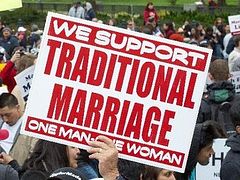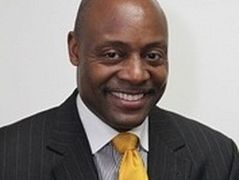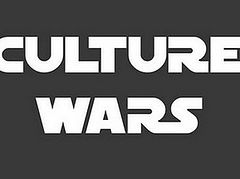Source: The American Conservative
By Rod Dreher

This is seriously interesting news:
More Americans feel comfortable with a presidential candidate who identifies as gay or lesbian than with one who identifies as an evangelical Christian, according to a new poll.
The latest WSJ/NBC poll listed a series of qualities in a potential presidential candidate and asked respondents whether they’d “be enthusiastic,” “be comfortable with,” “have some reservations about” or “be very uncomfortable with” a candidate with each of those qualities.
The results revealed that Americans are actually quite open to having a gay presidential candidate. Sixty-one percent said they would be either enthusiastic about or comfortable with a gay or lesbian candidate, while only 37 percent said they would have reservations or be uncomfortable.
By comparison, respondents were a little less comfortable with the prospect of a candidate who is an evangelical Christian. Fifty-two percent said they’d be enthusiastic about or comfortable with an evangelical Christian running for president, while 44 percent expressed some degree of hesitancy about the idea. (Two percent of respondents said they were not sure about a gay or lesbian candidate, while four percent were not sure about an evangelical.)
Here is a link to more detailed information on the poll, which shows that a clear majority of Americans now want gay marriage.
Look, we can complain that the negative opinions that many, perhaps most, Americans have toward Evangelical Christians are the fault of biased media, and we would have a point. The relentless cheerleading in the MSM for same-sex marriage over the last decade, plus the fact that Evangelicals have been the Christians most opposed to it, has taken its toll. I really do believe Evangelicals have gotten a raw deal from our media. But that’s beside the point now.
The point is, there’s nothing Evangelicals can do to turn it around, short of totally abandoning Christian orthodoxy on same-sex marriage — which a fair number of younger Evangelicals are eager to do. The Q Ideas conference kindly invited me to speak recently about the Benedict Option, and I told them that the Indiana moment was an “apocalypse” — which I explained meant here “an unveiling,” not “the end of the world” — in that it showed how few people in America 2015 cared about religious liberty, and how powerful the pro-SSM movement was. The fact is, ours is a post-Christian society moving towards an anti-Christian one, when Christianity conflicts with secular orthodoxy. Any churches that remain faithful to clear Biblical teaching about sexuality — gay or straight — and on the meaning of marriage and the human person, will be increasingly anathematized in this country. And those that compromise will, in time, fade to nothingness, as the ongoing unwinding of the Mainline Protestant churches demonstrates.
The United States has avoided Europe’s fate for a long time, but the churches here have finally lost the ability to coast on cultural momentum. The churches that don’t retrench around building their internal strength and coherence around orthodoxy — and that requires far more than catechesis, but it requires at least that: teaching our story to our children — and evangelizing from that position of strength, aren’t going to survive. The overculture is just too strong. The forces of atomization and desacralization are very hard to resist.
This is a reality that many Christians, Christians of all kinds, do not want to face. I know very little about Evangelical culture, so prior to Q, I asked a prominent Millennial Evangelical, a thinker I greatly respect, to tell me what I might expect there. He told me that Evangelicals, especially those of his generation, have a particular blind spot about the broader culture. In his view, they have a naive understanding of cultural dynamics, and think that they will be more acceptable to the mainstream if they simply behave with more winsomeness towards them.
Let me make something clear: it is not not not the case that being a self-righteous jerk is the solution! A new book I need to read is Collin Hansen’s aptly titled Blind Spots, which is about how Christians react out of their own experiences, and fail to see truths about themselves and their approach to the world that are obvious to others. Early in the book — this, according to what I could read on Amazon’s “Look Inside” feature — Hansen talks about how what drew him to faith as a teenager who had grown up in an unbelieving home was the happiness and confidence radiating from Christian kids in his school. From what I gather about the book, it’s about teaching Christians how to be fully Christian — that is, knowing the Christian story, living it out counterculturally, and doing so not with brittleness and hostility, but with joy. I ran across Hansen’s book researching this post; it sounds like something well worth reading. Anyway, anybody who thinks I’m advocating a Christian response that’s angry and hostile is wrong, and that needs saying before we go further.
Now, we ought to react to the rest of the world with kindness, empathy, and respect not as an evangelism strategy, but because it’s the right thing to do. That said, I think it’s simply true as a general matter that you can be as nice as you can be, and the world will still hate you. This is massively true when it comes to the gay rights question. There’s a racist joke that speaks to an ugly truth here: “Q: What do you call a millionaire black brain surgeon? A. [racial slur].” The idea is that for people who hate black folks, nothing that black folks do matters; it’s who they are that the racist cares about. Similarly, for many (though certainly not all) modern people liberal conviction, it doesn’t matter that orthodox Christians serve the poor, or do good in their own communities. What matters is their stance on homosexuality.
If that weren’t true, the Evangelical pastor Louie Giglio would not have been disinvited from the second Obama inaugural over a twenty-year-old sermon on homosexuality. Never mind that Giglio is widely known for his tremendous work in fighting human trafficking. A two-decade-old sermon taking the traditional Christian view was enough to force him out. If that weren’t true, the Gordon College students who work as volunteers in the poverty-stricken Lynn, Mass., public schools would not have been thrown out by officials who object to Gordon’s traditional Christian policies on sexuality, especially homosexuality. If winsomeness changed minds on this issue, Gordon president Michael Lindsay, who is one of the gentlest, kindest men you will ever meet, would not be fighting to keep his school from being dismantled.
David French, a lawyer and conservative writer who advised Gordon’s leadership during its fight to maintain its accreditation, believes that Gordon has just won a decisive victory for religious liberty in beating back the threat to take away its license, basically, over its gay rights policy. I wish that were true. I think Robert A. J. Gagnon, writing in First Things, has by far the more realistic view of what’s going on, and what’s likely to happen. Excerpts:
The New England Association of Schools and Colleges (NEASC) may have left Gordon alone for the time being but only because they are satisfied that advocates for homosexual relations have (so to speak) secured the beachhead and are advancing inland. After reading the College’s own “Questions about Gordon’s Working Group” I felt some sadness for a college I love (my wife is an alum of Gordon; I took a transfer term there in Spring 1979 while a Dartmouth student).
Yes, the Board “unanimously reaffirmed the College’s historic, theological conviction regarding biblical teaching around human sexuality and behavior, and is not making any change at this time to the College’s Life and Conduct Statement” (my emphasis). Yet why add “at this time”? The qualifier sounds ominous.
More:
I am concerned that the Administration and Board may have made too many concessions to an “LGBTQ” agenda, presumably under duress and some wishful thinking. They are therefore in need of our support and prayer. These concessions include the following:
(1) Deferential recognition of advocates of sexual heresy at Gordon. I had thought that only a tiny minority of Gordon’s faculty, staff, and students were supporting a change in the sexuality standard. So I had hoped that the governing authorities at Gordon would have rejected advocacy of homosexual unions as being every bit as inconsistent with continued association with the College as advocacy of consensual incest, polyamory, adultery, and fornication.
Instead, we only read: “The Board . . . clearly recognizes that the campus and Gordon’s constituents are not of one mind on this topic.” Why are proponents of homosexuality being given such legitimacy? Has the train already left the station?
There’s more, and you should read the whole thing. Gagnon stresses that he writes not to condemn Gordon College or to encourage people to write it off, but to point out how extremely difficult its circumstances are, and to dissuade Christians from having false confidence.
Gagnon is right: the progressives have a beachhead within the college, and they are going to push and push and push until they get what they want. And the thing is, Gordon is not unified internally, as this controversy revealed. Besides, 43 percent of Evangelical Millennials favor same-sex marriage – a number that is almost certainly going to grow. All the overculture has to do is keep up the pressure, and they’ll eventually have Gordon, and many other schools like it. Let there be no gloating from non-Evangelical Christians. Many Catholic colleges and universities all over have long since capitulated. Evangelical institutions are outliers.
Also writing in First Things, Carl R. Trueman points to the necessity of what I call the Benedict Option: a drawing inward to shore up our communal and confessional identity and to build resilience for the long night ahead. We must fight for our freedom to be ourselves, but Trueman says that’s only half the battle:
I suspect in the coming years the temptation will be to focus on the latter, on protest, as we fight in the public square for freedom of religion. Yet we must not allow the immediacy of the public problem to blind us to the critical importance of proper teaching for those within the Church. The redefinition of human identity which we are witnessing today is so comprehensive in its scope that Christians need something equally comprehensive if they are to be able to hold fast their confession. And—mark this well—our children will only think that protest worthwhile if we have taken pains to teach them that the Church and her confession are important in the first place. Teach your children by precept and example that church is an optional extra and you teach them that protesting the world’s values is the folly of fools.
Churches which are doctrine-lite, or which define themselves with a ten or twelve point doctrinal statement, or which portray themselves as a nice, fun supplement to the more important things of life, are rather like the little pig who built his house of straw. When the wolf blows, the house will simply vanish in the wind. For Christians to continue to protest the world in the public square, they need first to be deeply and seriously grounded in the historic, doctrinal, and elaborate Christian faith. A faith built on Wikipedia articles or reducible to 140 characters points to no lasting city.
To the extent that we believe that victories like the limited win Gordon College just won — and thank God for even limited victories! — are sufficient, we are deceiving ourselves. We have allowed ourselves for generations to be hollowed out from within. The hour is late, and the task is immense. But what else is there? If we think that abandoning core tenets of the historic Christian faith is going to save the church, we are not serious.
And if we believe that being winsome and likable and all that is going to earn us any points with the overculture, we are making a dangerous mistake. Assimilation is not going to be allowed absent giving up what makes Christians distinctive from the rest of the culture. Charlie Gallo, a Lynn, Mass., school committeeman who led the charge to throw Gordon College interns out of impoverished city schools,likened the Evangelical school to the KKK. This kind of thing shocks and appalls Christians, who know perfectly well that they are not the same thing as racial terrorists. But they don’t get that this is the logic that drives the ideology of the contemporary gay rights movement. Sexuality is the same thing as race, in their minds, so to pass negative judgment on any sexual identity is to be no better than a racist. All the winsomeness in the world cannot overcome that ideological conviction in the minds of most people who hold it.
And so, we come to a point in American history when more Americans find an Evangelical Christian presidential candidate unacceptable than a homosexual one. (For the record, I would not rule out voting for either an Evangelical or a homosexual for president.) This polls result ought to shock you. It’s not going to get any better in our lifetimes for Christians, and is in fact going to get worse. Fight for religious liberty, and vote for candidates who will defend religious liberty? Absolutely. This is not negotiable. But understand that those victories mean nothing if the liberty is not put to use to build a church of resistance behind the culture war battle lines. Because the truth is, we and our children, and our children’s children, are going to be living under occupation for generations. We have to prepare ourselves and our communities for the long haul.
As a friend told me the other day, we need knights, but we also need gardeners. We need lots of gardeners. This is the Benedict Option. The church as culture. Gardening for Christian radicals. I think I’m becoming a right-wing Hauerwasian.Here’s Hauerwas:
I also try to develop epigrams that have been forced on me by positions I have taken whose implications I slowly come to understand.
For example, I say, “The first task of the church is not to make the world just. The first task of the church is to make the world the world.” I know that sounds offensive to most people, Christian and non-Christian. Of course, I want it to be offensive. I am trying to challenge the assumption that Christianity is acceptable in modernity as long as it supports moral and political causes most people assume anyone should support–e.g., democracy. Such a view assumes that God can be entertained as a possibility as long as we keep it to ourselves. So I try to remind Christians by such an epigram that–as Augustine maintained–the church’s first political task is to worship the true God truly.
More Hauerwas, from right after 9/11:
American Christians simply lack the disciplines necessary to discover how being Christian might make them different. For example, after the Gulf War, people rightly wanted to welcome the troops home, so they put yellow ribbons everywhere including the churches. Yet if the Gulf War was a “just war,” that kind of celebration was inappropriate. In the past when Christians killed in a just war, it was understood they should be in mourning. They had sacrificed their unwillingness to kill. Black, not yellow, was the appropriate color. Indeed, in the past when Christian soldiers returned from a just war, they were expected to do penance for three years before being restored to the Eucharist. That we now find that to be unimaginable is but an indication how hard it is for us to imagine what it might mean for us to be Christian.
The current outpouring of patriotism, I think, is an indication of how lonely we are today. We are desperate to be part of some common endeavor. I am often called a communitarian, but I think that is a mistaken description. I am not for a rediscovery of community as an end in itself. Such a rediscovery can be as dangerous as it can be good. Rather, I try to help myself and others rediscover what it might mean if the church constituted our primary loyalty.
In all this, we must remember that the reader Isidore the Farmer is right when he warns that doom-and-gloomery will not do:
In a way, it would almost be ideal if someone peeking over the wall assumed the Benedict Option was run-for-the-hills-slow-death, only to encounter it and discover it is a celebration, a feast, an adventure, and the thing they had been needing all along.
Exactly right. Exactly. The thing that won Collin Hansen to the faith was not a community of fear, but one of joy. Yet that joy is not simply a feeling; it is rooted in a way of thinking and living and loving that is disclosed to Christians in the Bible and in the historical witness of the church. As a martyr once put it, “We are fighting today for costly grace.” The joy is free, costing not less than everything.







No, the majority of Americans do NOT want to see gay marriage legalized. The news outlets in the USA are notorious for releasing fake poll results.